Air distribution
Knob D-fig. 72 directs the air inside the passenger compartment according to five levels:
 conveys the air to the central and
side vents directly to the body (face/chest);
conveys the air to the central and
side vents directly to the body (face/chest);
 conveys warmer air to the lower vents
and cooler air to the central vents and dashboard vents (bilevel);
conveys warmer air to the lower vents
and cooler air to the central vents and dashboard vents (bilevel);
 exploits the characteristic of warm
air to move upwards ensuring a faster warming of the passenger compartment;
exploits the characteristic of warm
air to move upwards ensuring a faster warming of the passenger compartment;
 ensures good passenger compartment
warming and prevents misting up at the same time;
ensures good passenger compartment
warming and prevents misting up at the same time;
 all the air is conveyed to the windscreen
and front side windows for demisting and defrosting.
all the air is conveyed to the windscreen
and front side windows for demisting and defrosting.
The distribution levels are graphically illustrated in the following figures.
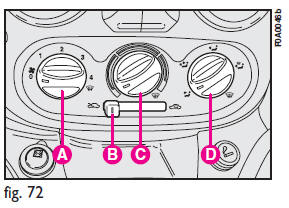
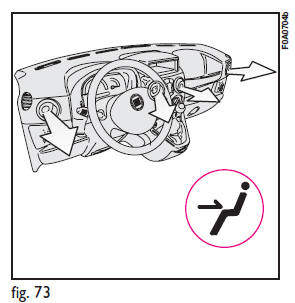
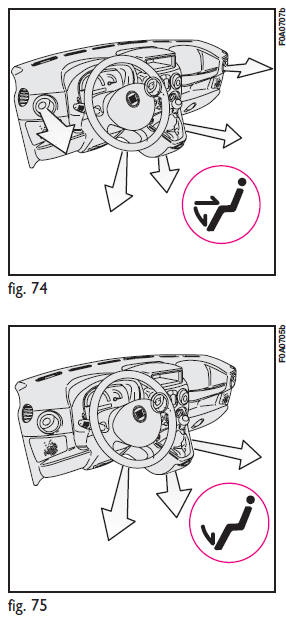
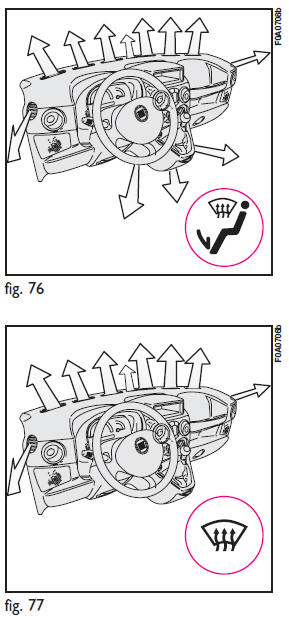
Heating
1) Air temperature knob C: pointer in the red sector.
2) Fan knob A: pointer at the required speed.
3) Air distribution knob D: pointer at
 to warm the feet and demist the windscreen
at the same time;
to warm the feet and demist the windscreen
at the same time;
 to convey air to the feet and cooler
air to the central vents and dashboard vents;
to convey air to the feet and cooler
air to the central vents and dashboard vents;
 for fast heating.
for fast heating.
Fast heating
1) Close the vents on the dashboard.
2) Air temperature knob A: pointer at
 in the red sector.
in the red sector.
3) Fan knob A at fourth speed, pointer at 4
 .
.
4) Air temperature knob D: pointer at
Demisting and defrosting the windscreen and the front side windows
This function - called max-def - is obtained by turning the control pointers to the orange symbols, specifically:
1) Air temperature knob A: pointer at
 in the red sector.
in the red sector.
2) Fan knob B: pointer at top speed 4 .
.
3) Air distribution knob D: pointer at .
.
4) Slider B at 
After demisting and/or defrosting, operate the controls to restore the required comfort.
To prevent misting up:
IMPORTANT
If the outside air is very damp, if it is raining and/or if there is a considerable difference between temperature inside and outside the vehicle, prevent the windows from misting up as follows:
Ц slider B at  ;
;
Ц air temperature knob C: pointer at
 in the red sector;
in the red sector;
Ц fan knob A at second speed or faster, pointer at 2;
Ц air distribution knob D: pointer at
 ; switch to
; switch to
 if the windows start misting up.
if the windows start misting up.
If the vehicle has a climate control system, you are recommended to adjust the controls as described above and press button A-fig. 78 to speed up the demisting process.
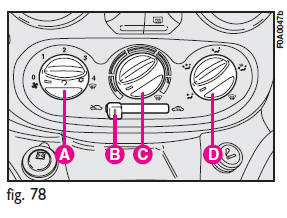
Demisting and defrosting the rear window/s
Press button  The electric mirror
demisting device also comes on.
The electric mirror
demisting device also comes on.
Warning light  on the instrument
panel will turn on.
on the instrument
panel will turn on.
You are advised to switch the button off as soon as the rear window is clear.
Ventilation
1) Centre and side vents: completely open.
2) Air temperature knob C: pointer in the blue sector.
3) Slider B at
4) Fan knob A: pointer at the required speed.
5) Air distribution knob D: pointer at

Recirculation
With the slider B at  the internal
air is recalculated.
the internal
air is recalculated.
IMPORTANT
This function is particularly useful when the outside air is heavily polluted (in a traffic jam, tunnel, etc.) and when running on dusty roads. You are advised against using this function for long periods, however, especially if there are a lot of people in the vehicle or on cold or rainy days since the windows could mist up effecting visibility and driving.
See also:
Memory Feature
The driver seat also has a memory feature, which can operate in two ways:
Memory Function Option 1) Ч Full Seat Back And Track Fore/Aft Position Memory:
After using the EZ entry function, the
Afte ...
8. Generic Warning Light
The Generic Warning Light will illuminate if any of the following conditions
occur: Oil Change Request, Engine Oil Pressure Sensor Failure, External Light Failure,
Fuel Cut-Off Intervention, Fue ...
Manual Transmission Ц If Equipped
The Sport mode increases steering feedback to the driver with slight increases
in effort and throttle pedal-to-engine response. This driving mode is useful while
driving on twisty roads where more ...


